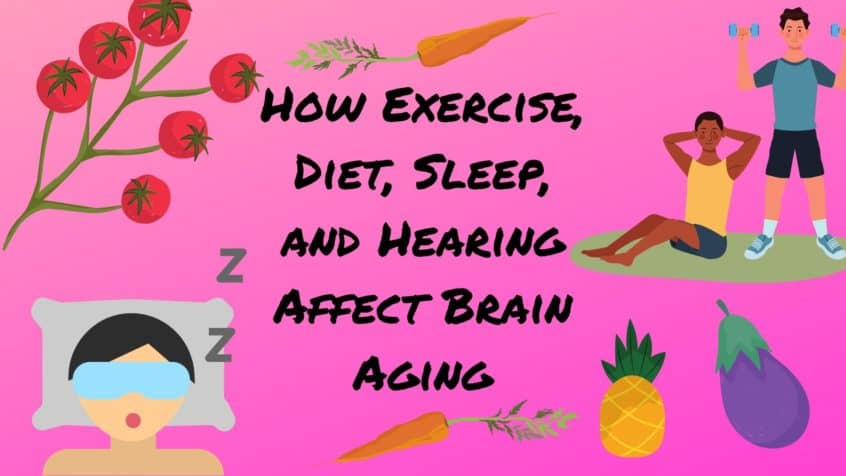How Exercise, Diet, Sleep, and Hearing Affect Brain Aging

It’s no secret that Americans are living longer than ever. We hear all the time about new advancements in medical science that allow formerly life-threatening medical issues to be treated or cured entirely. While life expectancy increases, we are understanding more and more that we don’t just want to add years to our lives: we want to add quality years to our lives.
It’s normal as we age for our brains to slow down a little. It’s not that we become less intelligent, but we do tend to become less flexible. We become ingrained in our habits and opinions, and it takes a little longer for us to process new information, react to sensory stimuli, and think through complicated ideas. This is likely because aging is associated with a shrinkage in the brain’s white matter tissue, possibly as a result of demyelination.
Demyelination is a problem with the myelin sheath that surrounds the axon of a neuron, where energy is transmitted. Myelin is a fatty substance that helps keep energy from “leaking” out of the neuron as it transmits, and also helps it transmit faster. When myelin sheaths deteriorate, the brain cell no longer functions as effectively as it once did.
While these changes in the brain may be normal, it doesn’t have to be the case that we proceed on to diseases like Alzheimer’s and dementia. Maintaining our best possible brain health is key to ensuring that our later years can be quality years.
Stephen M. Stahl, MD, PhD, adjunct professor of psychiatry at the University of California San Diego laid out four major contributing factors to our brain’s health as we age. In a presentation at the 2017 Neuroscience Educational Institute (NEI) Congress, he said that exercise, diet, sleep and hearing were potentially the most important factors affecting how we age.
Exercise
Exercise has important benefits for people of any age. Unfortunately, it can be difficult for us to make time to exercise, and it’s even harder for those who do not already have the habit. Starting and maintaining an exercise habit is incredibly important, however, to maintaining our best overall health and well-being throughout our lives.
Stahl reports that a meta-analysis showed that aerobic exercise has major benefits on episodic memory, processing speed, executive functioning, and attention in older adults without dementia. Intermittent moderate-intense exercise and repeated mild exercise can actually improve thinking and memory in patients with mild cognitive impairment. It’s almost never too late to start seeing the benefits of exercise!
Diet
A healthy diet and regular exercise go hand-in-hand when it comes to improving our quality of life. Stahl focused on two diets in particular—Dietary Approaches to Stop Hypertension (DASH) and the Mediterranean Diet (MediDiet). Both of these diets recommend high intake of fruits, vegetables, nuts and legumes. They also both suggest low intake of red and processed meats.
It appears that both diets have positive impacts on brain health. Interestingly, a study conducted by Brigham and Women’s Hospital found that DASH and the Alternate Mediterranean Diet (AMED—similar to the MediDiet) significantly reduced study participants’ likelihood of developing hearing loss over a four-year period. Who knows what other important body functions might be shown to benefit from these diets in the future?
Sleep
About 50% of older adults have insomnia, and another 50% have sleep disordered breath. Slow wave sleep—the kind of healthy, deep sleep we are expected to get each night—helps clear amyloid beta from the brain. Amyloid beta is the plaque that builds up in the brains of patients with Alzheimer’s disease. When we are sleep deprived, this plaque can build up more easily.
Hearing
Hearing loss affects about two-thirds of Americans over age 70, and, when left untreated, is associated with brain atrophy and earlier onset of cognitive decline and dementia. There is early evidence suggesting that hearing aids can help turn around the brain health of patients with mild cognitive impairment.
Those with severe hearing loss are at five times the risk of developing dementia as those with normal hearing, while those with mild hearing loss are twice as likely to develop dementia.
Mt. Hood Hearing
Our hearing health professionals can help you understand how hearing loss treatment can improve your life. If you or a loved one is having issues with hearing loss, make an appointment with us for a hearing test today!
